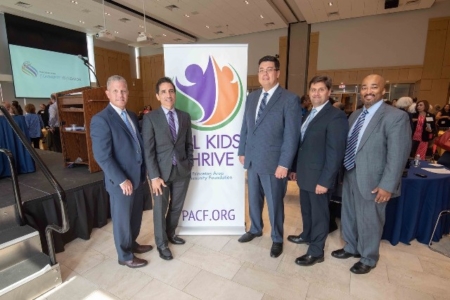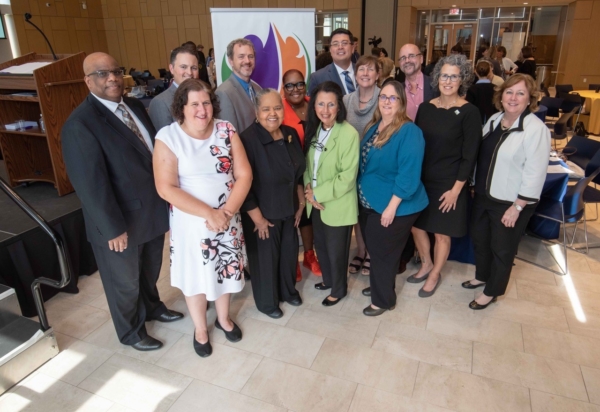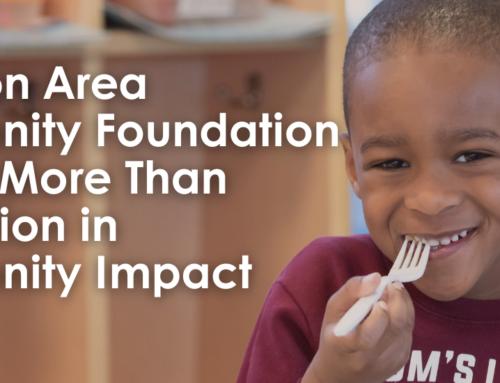The Princeton Area Community Foundation is awarding a total of $3 million in grants to 10 nonprofit and school partnerships that will work to reduce chronic absenteeism in our region.
Each partnership has been awarded a $300,000 All Kids Thrive grant that will be paid out over 5 years. This long-term commitment will likely reduce administrative burdens on schools and nonprofits, allowing them to focus on impact.
Chronic Absenteeism in Mercer County
All Kids Thrive is the Community Foundation’s bold new initiative to transform the lives of young people living in poverty, which is among the risk factors for chronic absenteeism.
In Mercer County, more than 1 in 10 students are chronically absent from school – they miss an average of two days a month or about 10 percent of the school year. Those absences dramatically lower their chance of success throughout their lives.
The 10 partnerships will work in four communities: Trenton and Hamilton, which have the highest levels of chronic absenteeism in the county, and in Lawrence and Princeton, whose district rates fall below 10 percent, but have rates among certain student groups that are well above 10 percent.
Community Involvement
Key to this plan is community involvement. The George H. and Estelle M. Sands Foundation, NJM Insurance Group and Verizon have pledged financial support to All Kids Thrive. The partnerships awarded All Kids Thrive grants have designed plans that require parents, educators, students and nonprofit leaders to work together to help keep kids in school. Often that means providing services for entire families.
“We are thrilled about the community’s enthusiasm for All Kids Thrive,’’ said Jeffrey M. Vega, President & CEO of the Community Foundation. “We look forward to working with our nonprofit friends, teachers, parents and school administrators on these plans. We are also grateful for the financial support we have already received, and we hope other funders will join us as we work to strengthen the educational pipeline in Mercer County.”
 Why Kids Miss School
Why Kids Miss School
The ten partnerships that were awarded these grants were among a larger group of 18 teams that received $12,500 planning grants earlier this year. As part of that planning process, the teams were required to conduct focus groups with students, parents and educators to learn more about the causes of absenteeism in our region.
Those findings showed there is a myriad of reasons students miss school in Mercer County: hunger, a lack of clean clothes, illness, family responsibilities, transportation and childcare barriers, bullying and bad weather.
Reducing Absenteeism
Based in part on those survey responses, the teams developed individualized strategies to reduce chronic absenteeism in schools, including plans to:
- create a laundry facility at a Trenton elementary school;
- provide volunteer translators for parents;
- determine which students are most at risk, including kids with chronic illness, then develop personalized plans to help them;
- match students with mentors; and
- feed students breakfast before the school day begins
 “We are so excited about these partnerships,” said Eleanor Horne, the Chair of the Community Foundation’s Committee on Impact. “Awarding these grants is the culmination of a whirlwind of activity for us. We have been working and learning together in mutually beneficial ways. We are usually thought of as a grantmaker, but we are now, literally, the foundation upon which many plans are standing. We have created new partnerships that have made us, truly, a community foundation.”
“We are so excited about these partnerships,” said Eleanor Horne, the Chair of the Community Foundation’s Committee on Impact. “Awarding these grants is the culmination of a whirlwind of activity for us. We have been working and learning together in mutually beneficial ways. We are usually thought of as a grantmaker, but we are now, literally, the foundation upon which many plans are standing. We have created new partnerships that have made us, truly, a community foundation.”
Here is the list of grantees and their partners:
Hamilton
Foundation for Educational Administration will work with all Hamilton schools to build and sustain positive school environments, so students want to attend class. School Climate Teams will provide outreach to parents about attendance and develop personalized attendance plans for struggling students. The agency will also map and analyze all resources currently used to address student needs to determine ways to enhance those resources and where gaps may exist.
Young Audiences NJ and Eastern PA will work with G.E. Wilson Elementary School on four arts education programs because studies show the arts helps improve attendance rates. There will be monthly performances that complement academic studies, a Theatre to Learn program that teaches language arts concepts through improvisation and drama, and a family arts and creativity program. A master teaching artist will also help teachers integrate the arts into other curricula.
Lawrence
Every Child Valued (ECV) will work with the Eggerts Crossing Village housing development and Educational Testing Service (ETS), focusing on students living in that neighborhood and other low-income students who attend Lawrenceville Elementary, Franklin Elementary, Slackwood Elementary, Eldridge Park Elementary and Lawrenceville Intermediate schools. ECV already runs successful after-school and summer programs for children at Eggerts Crossing. They plan to begin a breakfast program, and they will hire a monitor to supervise children at the local bus stop because before-care is a problem for parents there. They also plan to add another learning coach at their 4th to 6th grade after-school program because parents indicated students are missing school because of incomplete homework. The organization will also host quarterly dinners for parents and will connect families with other social service agencies.
Princeton
Princeton Family YMCA will work with Corner House Behavioral Health and The Corella & Bertram F. Bonner Foundation at Princeton High School and Witherspoon Middle School to reduce chronic absenteeism among boys of color. With the Princeton Stronger Together Partnership, they will replicate THREAD, a team-mentoring program proven successful in Baltimore. Teams weave together support networks for students, broadening their social networks, academic opportunities and enrichment activities. Collaborators will also provide pro bono resources to students and their families, such as employment opportunities, housing and healthcare.
Trenton
Arm In Arm will partner with Henry J. Austin Health Center, LALDEF (Latin America Legal Defense and Education Fund), Latinas Unidas, and Westminster Presbyterian Church to work at Robbins Elementary School. A navigator will help link parents with needed services provided by the partner agencies, such as health screenings, English as a Second Language classes, childcare services and parenting skills workshops. They also plan to establish laundry facilities at the school, and provide economic mobility mentoring for families, which will include trips to the Arm in Arm food pantry and job training.
Hedgepeth-Williams Middle School of the Arts will work with LALDEF and the Foundation for Educational Administration on a plan that will include reducing elevated absenteeism rates among bilingual students. Although the school dramatically reduced its chronic absenteeism rate from 23 percent to 7 percent, the rate rose again after bilingual students moved there as part of a redistricting plan. LALDEF will provide services for the families, including interpreters at appointments, so the children do not have to miss class to serve as translators for parents at job interviews and doctors’ offices. The school also plans to continue its focus on arts integration to motivate students to attend school.
Mercer Street Friends will work with parent liaisons, the PTO, and community groups at Gregory Elementary School. The agency plans to use parent engagement activities to raise awareness and an evidence-based program called Check & Connect to engage students who show early signs of absenteeism. They will also offer therapy and case management to chronically absent students and their families.
The Trenton Health Team will work with Isles to combat absenteeism among students who suffer from chronic illness (asthma or lead poisoning) in all Trenton schools. They will begin at Martin Luther King Jr. Elementary and Luis Munoz Rivera Community Middle schools, then scale up. As they identify students who need intervention, they will try to determine if there are hotspots within the city – for example, an apartment building with moisture or pest problems. If so, then they will work with Isles on Healthy Home interventions. Trenton residents make up 23 percent of Mercer County’s population, but accounted for 76 percent of the county’s asthma-related emergency room visits.
Trenton Prevention Policy Board at The College of New Jersey will work with TCNJ Center for Community Engaged Learning and Research, Mercer County Department of Human Services, Isles and Millhill Child and Family Development Center to create Connect Trenton at the city’s 9th Grade Academy. The new program will provide direct services to students who struggle with attendance, academics or behavioral issues. A coordinator will link students and families with community services that can best serve their needs.
Trenton Public Schools will train Attendance Improvement Teams in every school and create comprehensive parent and community engagement plans, as well as a parent resource center. They will partner with the other Trenton-based All Kids Thrive grantees to improve attendance districtwide with the Every Day Matters plan.






